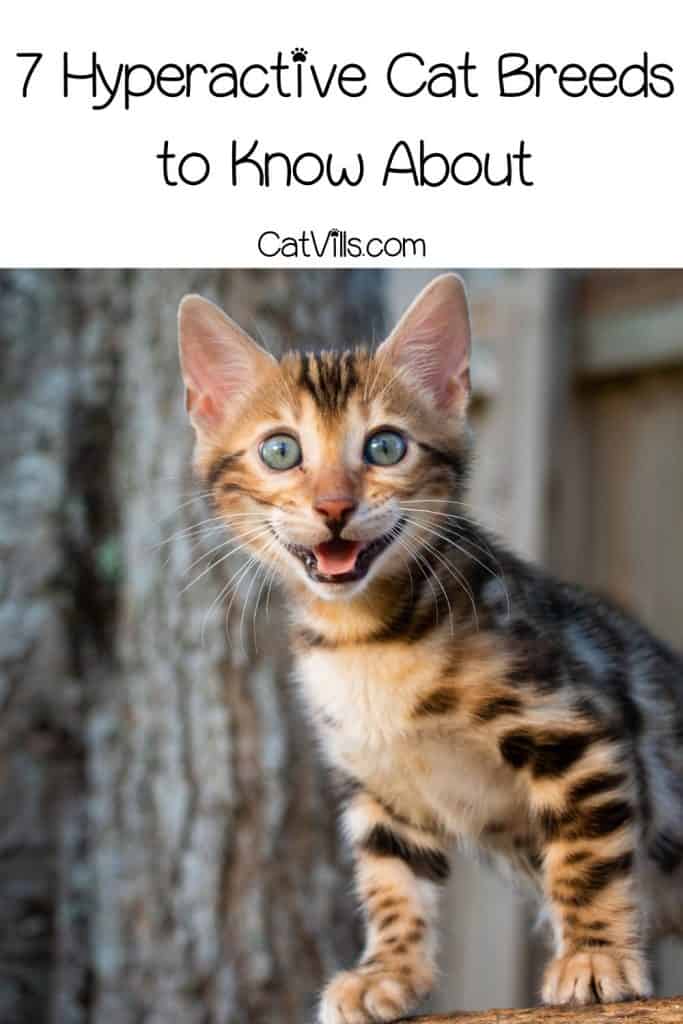Last Updated: 2 years ago
Is your heart into fun-loving, hyperactive cat breeds?
Perhaps you adore their high energy levels, quirky personalities, and fishy strolls around the house!
These wacky, zany, and sometimes weird most active cat breeds have ways to bring a spark and tons of laughter into your home.
Let’s look at seven of the most energetic kitties who’d love to be your pals for life and the reasons for their hyperactivity below.
7 Hyperactive Cat Breeds
All cats can sometimes get a little crazy, complete with choruses of meows and zoomies around the house.
While most cats will naturally be active, the below breeds have this behavior hardwired into their systems.
If you’re into feisty felines full of attitude, then one of these breeds could be a sassy soul mate for you.
1. Siamese
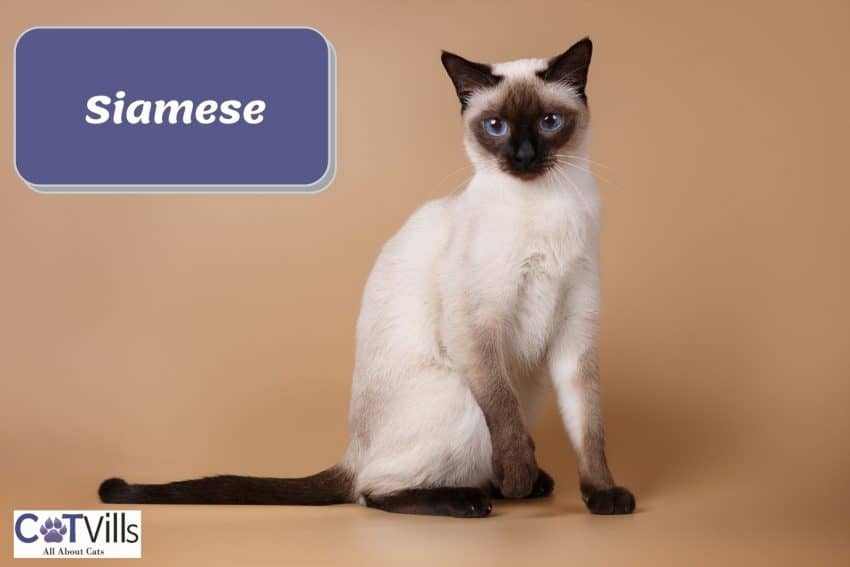
Siamese cats are territorial to the point that many consider them aggressive.
They spend their days seeking attention and lash out in the slightest feel of lack of it.
If you have other pets, then be ready to handle the jealousy in these cats.
They take a long time to get social with other pets and pick fights more often than you can count.
However, Siamese cats are very affectionate towards those who’ve earned their respect.
They’re also intelligent, with a distinct outgoing nature.
2. Abyssinian
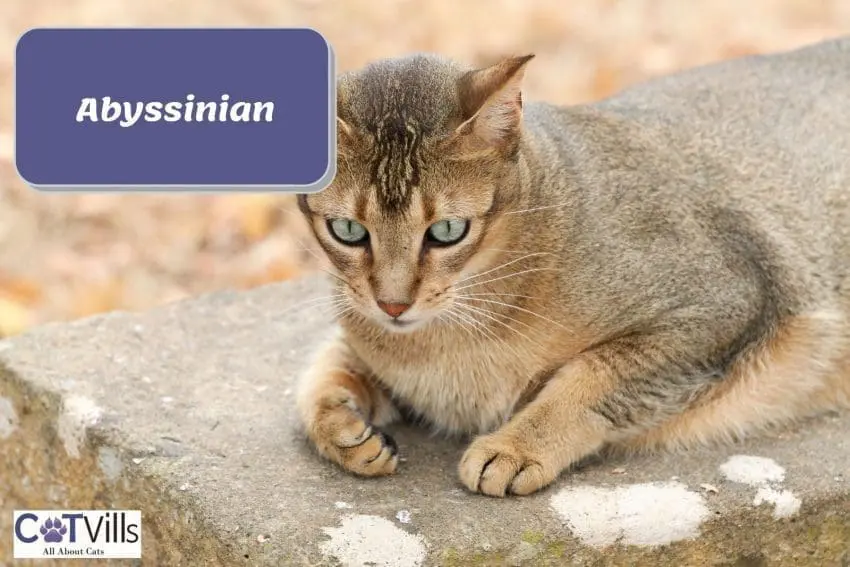
Abyssinian cats have a unique and ticked coat. They are gorgeous, full of energy, with impressive sharp minds and peculiar charming personalities.
An Abyssinian enjoys company and will walk around the block with you while splashing water all over happily.
However, they are emotionally needy and likely to fall into depression if they lack attention too often.
3. Bombay
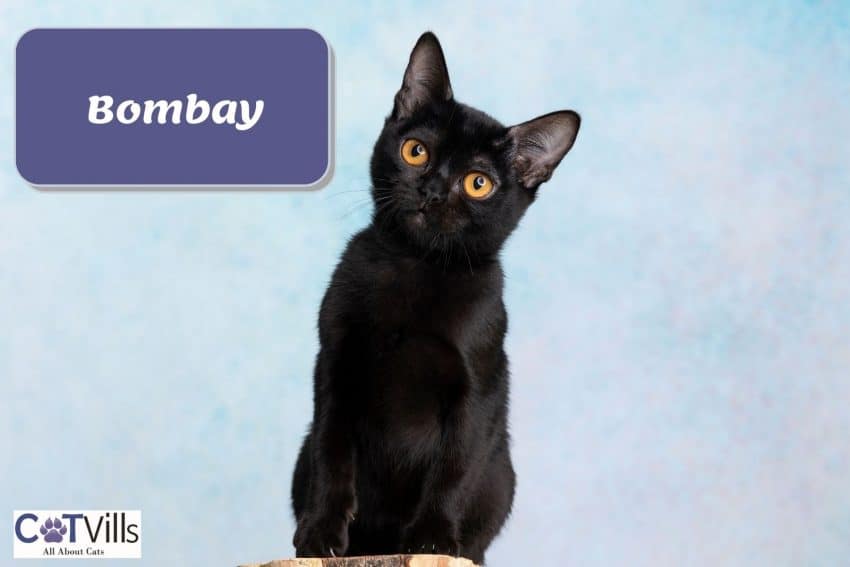
She likes walking on a leash, is very friendly, and is quick to be the first to greet visitors at your home.
You’ll love the intelligence and easygoing trait and how she snuggles under the blankets with you.
But don’t be entirely fooled by the Bombay cats, as these fearless and aggressive soul mates can quickly become hyperactive if not given enough attention.
4. Bengal
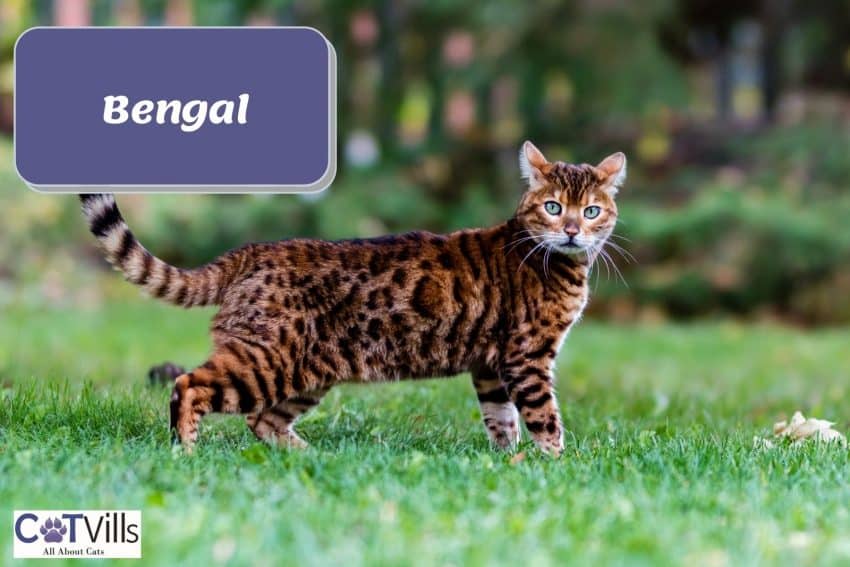
They’re beautiful and wild. But all understandable from a cat breed which is a mix of leopards and housecats.
If you’re after a low-maintenance lap cat, then a Bengal is not for you. However, they’re friendly, exceptionally energy-packed, very curious, and always on the move.
They like adventure and exciting rides more than purring or snuggling and demand a lot of exercise.
If you can’t put up with the attention needs, then a Bengal cat can quickly develop aggressive behavior.
5. Scottish Fold
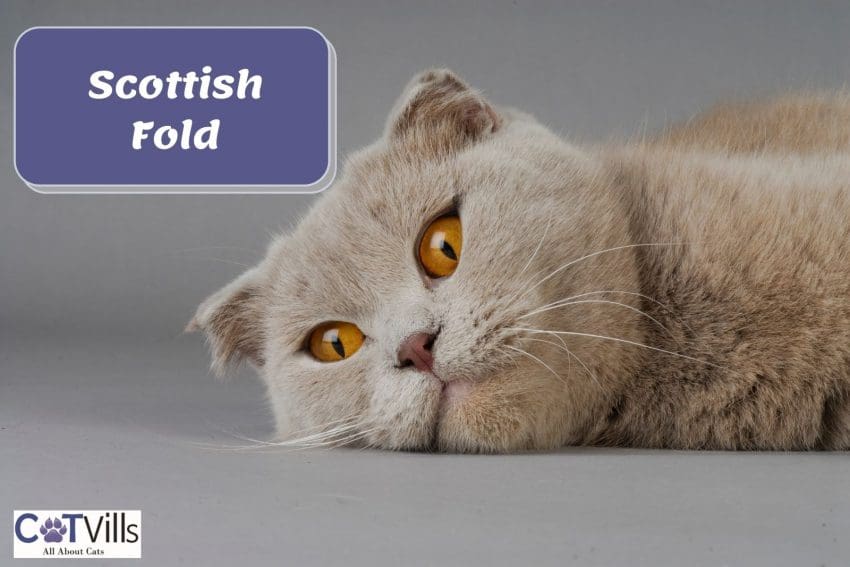
Whether you have a big family or several other pets, the Scottish fold cat breed is okay with it. They’re friendly, good with kids, and work well with cat-friendly dogs.
Unlike other very aggressive cat breeds, the Scottish Fold is softer and demands attention in soft meows and purrs.
Don’t be fooled by the innocent look, though, as this cat breed develops behavioral issues if not given enough daily attention.
If you’re rarely home or want a feline friend that’s not demanding, this is not the cat for you.
6. American Wirehair
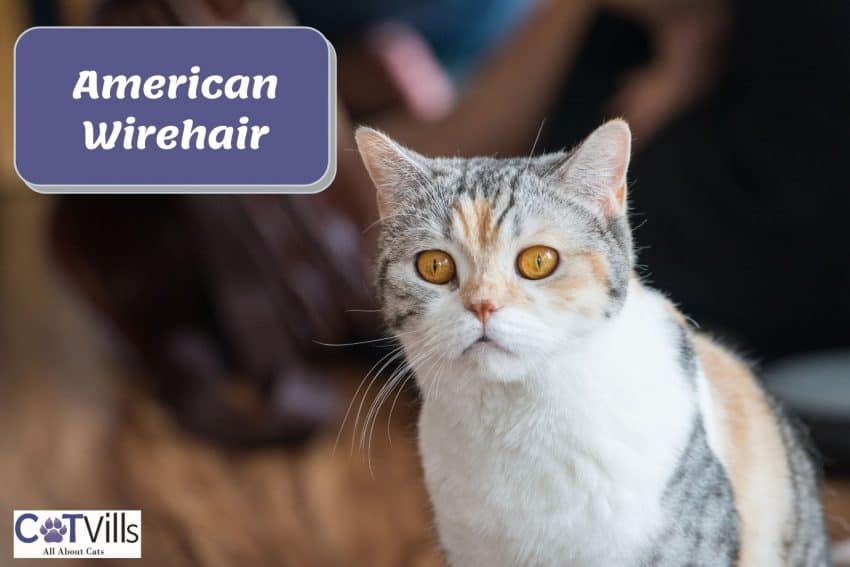
If you love cats but are busy all day long, then an American Wirehair can be a perfect match.
They’re affectionate and very active, but not too attention needy nor annoyingly hyper.
You’ll like how the American Wirehair cat minds its own business, keeping itself entertained.
However, if you love your furniture keep an eye on your American Wirehair. They’re notorious for destroying it with their claws!
So, invest in a good scratching post. Also, be prepared for daily animal catches from these fantastic natural hunters.
7. Sphynx
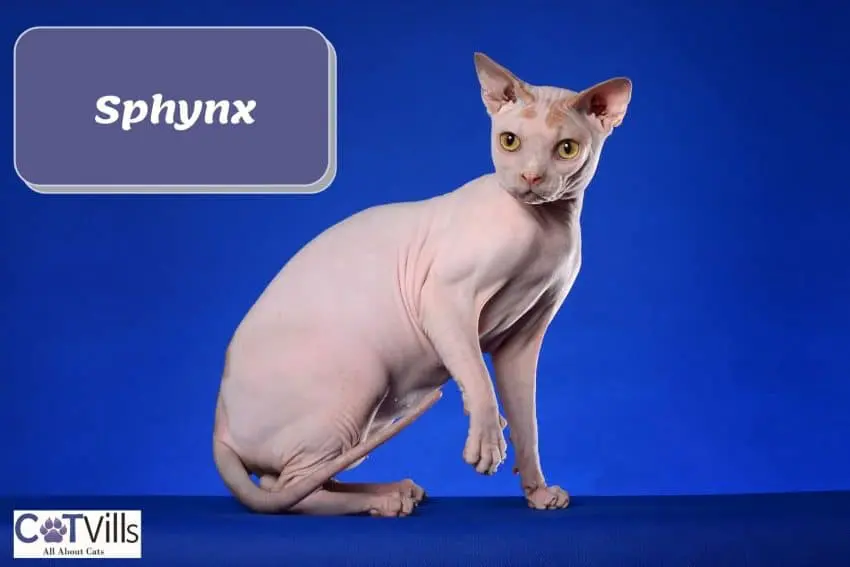
If you’re after loyalty, a cat that follows you around and is very happy at it, then get a Sphynx.
They’re intelligent, outgoing, and affectionate, and will follow along in your strolls to get enough attention.
These cats learn new tricks quickly and like lots of playtimes. Sphinx cats have doglike personalities, such as wagging the tail to signify happiness.
Needless to say, they’re also great cats if you don’t want to deal with a lot of fur flying everywhere!
Although don’t be fooled, they do require as much, if not more, grooming than the fluffier breeds to keep their skin healthy.
5 Reasons Why Your Cat Is Hyperactive
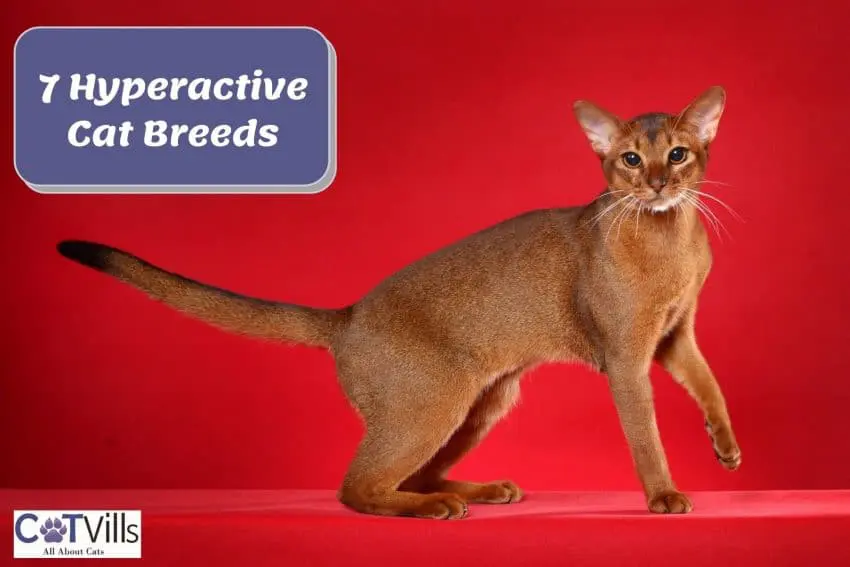
Sometimes the wacky are rib-cracking hilarious, but it can be alarming or frustrating, especially if sudden and unexpected.
Let’s discuss some reasons why your cat could be overly hyperactive.
1. Predatory Instinct
If you observe your cat grabbing, chasing, or jumping all over the place, don’t panic!
Your cat could be simply exhibiting natural hunting behaviors and burning some pent-up energy in the process.
It’s almost common among domesticated natural predators and should be a concern mainly when directed towards humans.
Provide toys like catnip mice or feather wands to keep your cat busy and burning calories naturally.
2. Nocturnal Instinct
Where do you leave your cat when you go to work? You possibly never give it a thought, but your feline friend could be spending lone days indoors.
These lonely cats often become more active at night when everyone is at home.
So, your cat isn’t crazy but nocturnal and expects some attention while you’re around to give it!
3. Senility
Many animals become senile or lose some cognitive function as they age. So if your cat is old, she could be losing it and expressing it through wild behavior.
That’s why it’s so important to take your cat to the vet any time you notice completely abnormal (for them) behavior.
4. Fleas
No animal likes the sporadic bites nor the movement of fleas on its skin, your cat included.
If Miss Kitty Fantastico is suddenly freaking out, zooming around, and rubbing her body all over the furniture, she could be crazily reacting to fleas on its body.
Especially if they bite in a place they can’t reach. If you suspect a fleas’ infestation, consult your vet for a prescription pesticide fit for fleas’ control in cats.
5. Your cat could be sick
Cats naturally express an underlying medical condition through aggressive behavior.
An excellent way to separate an energy burst from a health issue is to check the consistency and frequency of aggression.
In most cases, a sick cat wills show aggression more and more frequently.
Have a veterinarian examine your cat for common medical conditions like toxoplasmosis, abscesses, dental diseases, epilepsy, among others.
Hyperthyroidism is another possible explanation. In fact, it’s among the most common reasons for sudden hyperactivity in kitties.
So, let’s discuss that in a bit more depth.
Hyperthyroidism in Cats
Hyperactive cat breeds are naturally aggressive and attention needy.
However, when accompanied by other signs like weight loss, increased thirst, and appetite, or overly frequent urination, then you’re dealing with an entirely different scenario.
Your cat could be battling hyperthyroidism, and you can easily pick up the signs by paying attention to your cat’s body language.
According to VCAhospitals, at least 25% of cats suffering from hyperthyroidism are hyperactive.
Causes
Hyperthyroidism, also known as thyrotoxicosis, results from excessive production of thyroid hormones T3 and T4.
It usually occurs due to enlarged thyroid glands (thyroid hyperplasia), caused by a non-cancerous tumor (thyroid adenoma) or a malignant tumor (thyroid adenocarcinomas).
Due to the thyroid hormones importance in the body, hyperthyroidism could pose a secondary problem to your cat.
Other signs of hyperthyroidism include vomiting, hyperactivity, unkempt hair, and diarrhea.
Hyperthyroidism in cats can be tested through:
- Physical checks for enlarged thyroid glands
- Checking the heart rate and blood pressure measurement
- A blood chemistry panel
- Urinalysis
- Thyroid hormone levels analysis
Your vet can perform one or more tests to ascertain the disease and even do thyroid scintigraphy (thyroid scan) if the diagnostic tests are inconclusive.
Treatments
Among the most popular hyperthyroidism treatments include anti-thyroid medication, radioactive iodine therapy, surgical removal of the affected thyroid gland or abnormal thyroid tissue, and dietary therapy.
Once your cat recovers fully, you can have additional blood tests, and blood kidney values test to ensure your cat’s hormones have normalized fully.
Otherwise, your cat could develop secondary hyperthyroidism problems such as heart disease and high blood pressure.
FAQs
HOW DO YOU CALM DOWN YOUR HYPERACTIVE CAT?
If your kitty gets suddenly hyperactive, do the following to calm it down:
Play with your kitty, reduce or add the number of cats at home depending on the source of your cat’s stress.
Address any disease issue, make your outdoor and indoor safe for the cats and allow the cat to be as playful as they’re naturally.
IS YOUR CAT’S HYPERACTIVITY SOMETHING TO WORRY ABOUT?
Generally, you don’t need to worry about your cat’s hyperactivity, especially in young cats. It could be the cat is exhibiting hunting behaviors, escape techniques, or fighting maneuvers.
But when older cats become hyperactive, you should check for signs of hyperthyroidism or other diseases.
WHAT ARE THE MOST COMMON SYMPTOMS OF HYPERTHYROIDISM IN CATS?
Hyperthyroidism results in increased metabolism, thus increased appetite and thirst. The cat becomes restless and very aggressive.
Also, urination becomes too frequent, and periodic vomiting and diarrhea are likely to occur. The cat loses weight despite increased appetite, and the furs appear unkempt.
Conclusion
Hyperactive cat breeds are more intense than the average cat breed.
Unless under disease discomfort, their bursts of energy are impressive and likely to make you smile.
Even so, they are very demanding attention-wise and will not be ideal for first-time owners.
But if you can handle outbursts and aggression, then you got yourself pals for life.
Do you own any of these hyperactive cat breeds? How’s your experience with them? Please share with us!
Resources:
